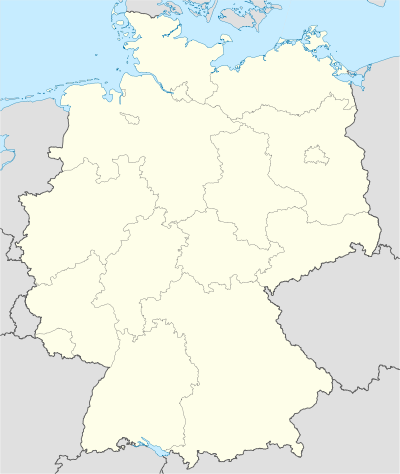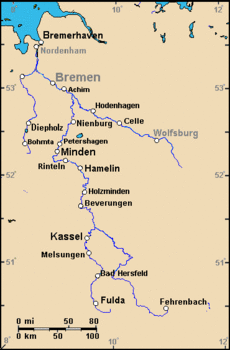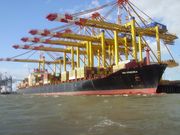Bremerhaven
| Bremerhaven | |
 |
|
 Bremerhaven
|
|
| Coordinates | |
| Administration | |
| Country | Germany |
|---|---|
| State | Bremen |
| City subdivisions | 2 boroughs with 9 districts |
| Lord Mayor | Jörg Schulz (SPD) |
| Basic statistics | |
| Area | 78.867 km2 (30.451 sq mi) |
| Elevation | 2 m (7 ft) |
| Population | 114,031 (31 December 2009)[1] |
| - Density | 1,446 /km2 (3,745 /sq mi) |
| Founded | 1827 |
| Other information | |
| Time zone | CET/CEST (UTC+1/+2) |
| Licence plate | HB |
| Postal codes | 27501-27580 |
| Area code | 0471 |
| Website | bremerhaven.de |
| Holidays and sightseeing Auswandererhaus |
Bremerhaven (German pronunciation: [bʁeːmɐˈhaːfən]) is the seaport of the free city-state of Bremen, a federal state of Germany. It forms an enclave in the state of Lower Saxony and is located at the mouth of the River Weser on its eastern bank, opposite the town of Nordenham. Though a relatively new city, it has a long history as a trade port and today is one of the most important German ports, playing a crucial role in Germany's trade.
Contents |
History

The town was founded in 1827, but there were settlements, such as Lehe, in the vicinity as early as the 12th century. These tiny villages were built on small islands in the swampy estuary. In 1381 the city of Bremen captured de facto rule at the lower Weser stream, including Lehe, later therefore called Bremerlehe. Early in 1653 Swedish Bremen-Verden's troops captured Bremerlehe by force.
Emperor Ferdinand III ordered his vassal Christina of Sweden, then Duchess regnant of Bremen-Verden, to restitute Bremerlehe to Bremen. However, Swedish Bremen-Verden soon enacted the First Bremian War (March to July 1654) and in the following peace treaty (Recess of Stade; November 1654) Bremen had to cede Bremerlehe and its surroundings to Swedish Bremen-Verden. The latter developed plans to found a fortified town on the site, which only later used to become Bremerhaven, and in 1672 - under the reign of Charles XI of Sweden, in personal union Duke of Bremen-Verden - colonists tried unsuccessfully to erect a castle (named Carlsburg after Charles XI) there, which was meant to protect as well as control the ships heading for Bremen.
Finally, in 1827 the city of Bremen under Burgomaster Johann Smidt bought the territories at the mouth of the Weser from the Kingdom of Hanover. Bremen sought this territory in order to retain its share of Germany's overseas trade, which was threatened by the sedimentation of the Weser around the old inland port of Bremen. Bremerhaven (literally in English: Bremian Harbour) was founded to be a haven for Bremen's merchant marine, becoming the second harbour for Bremen, despite being 50 km downstream. Due to trade with and emigration to North America, the port and the town grew quickly. In 1848 Bremerhaven became the home port of the German Confederation's Navy under Karl Rudolf Brommy.
The Kingdom of Hanover founded a rival town next to Bremerhaven and called it Geestemünde (1845). Both towns grew and established the three economic pillars of trade, shipbuilding and fishing. Following inter-state negotiations at different times Bremerhaven's boundary was several times extended on the expense of Hanoveran territory. In 1924 Geestemünde and the neighbouring municipality of Lehe were united to become the new city of Wesermünde, and in 1939 Bremerhaven was removed from the jurisdiction of Bremen and made a part of Wesermünde, then a part of the Prussian Province of Hanover.

Bremerhaven was one of the important harbours of emigration in Europe.
As a key base of the Kriegsmarine, most of the city was destroyed in the Bombing of Bremen in World War II; however, key parts of the port were deliberately spared by the Allied forces to provide a usable harbour for supplying the Allies after the war. All of Wesermünde, including those parts, which prior did not belong to Bremerhaven, was a postwar enclave run by the United States within the British zone of northern Germany. In 1947 the city became part of the Bundesland Bremen (Bremen Federal State) and was consequently renamed from Wesermünde to Bremerhaven. Today, Bremerhaven is therefore part of the city-state of Bremen, practically being a state of two cities, while also a city in its own right. This is complicated somewhat by the fact the city of Bremen has owned the "overseas port" within Bremerhaven since 1927. Further complicating matters, a treaty between the two cities (as mentioned in Section 8 of Bremerhaven's municipal constitution) makes Bremerhaven responsible for the municipal administration of those parts owned directly by Bremen (known as stadtbremisch).[2]
Twin cities
Bremerhaven's twin cities include:
|
|
The three roads connecting the city of Bremerhaven to the Autobahn 27 consequently are named after the original three twin cities:
- Cherbourger Straße (AS Bremerhaven-Überseehafen)
- Grimsbystraße (AS Bremerhaven-Mitte)
- Poristraße (AS Bremerhaven-Geestemünde)
In addition to that there are also streets, which earlier had been named after Szczecin (Stettiner Straße) and Kaliningrad (Königsberger Straße).
Transportation
Roads
Due to its unique geographic situation, Bremerhaven suffers from a few transportational difficulties. The city has been connected to the autobahn network since the late 1970s. The A 27 runs north-south, east of the city, connecting Bremerhaven to Bremen and Cuxhaven. Road connections to Hamburg, however, are poor. The Bundesstraße 71 and secondary roads therefore carry most of the heavy lorry traffic. A proposed solution is the construction of the A 22, the so-called Küstenautobahn (or "coastal motorway"), which would link Bremerhaven to Hamburg and Wilhelmshaven/Oldenburg (using the Weser tunnel). Roads leading to the overseas port are regularly overloaded with freight traffic, and solutions are presently being discussed, including a deep-cut road favoured by the city government and various interest groups.
Railway
Bremerhaven has three active passenger rail stations, Bremerhaven Hauptbahnhof in the city centre, Bremerhaven-Lehe north of the centre and Bremerhaven-Wulsdorf in the southern part of the city. A fourth station, Bremerhaven-Speckenbüttel near the border to Langen has been out of service since 1988, though it might reopen when the Bremen S-Bahn scheme becomes operational. Bremerhaven's central station lost its last long-distance train in 2001. Now only regional connections to Bremen, Cuxhaven, Osnabrück and Hamburg are available. The railways in Bremerhaven, however, still carry a heavy load of freight traffic, mostly new cars, containers and food.
Tourist attractions

|
Columbus Center and the "Seute Deern"
The Wilhelm Bauer at the German Maritime Museum
|
Bremerhaven has only a few historical buildings, and the high street and city centre are almost exclusively post-war. The main attractions for tourists are the German Emigration Center (since August 8, 2005) and the German Maritime Museum (Deutsches Schiffahrtsmuseum) on the historical harbour with many museum ships, such as the Type XXI U-boat Wilhelm Bauer, the Seute Deern (a three-masted sailing vessel), and the Hansekogge, a vintage ship dating from 1380. The Lloyd-Werft shipyard is renowned for building and renovating large cruise liners, for example the Norway. The fishing port also houses an aquarium (the Atlanticum). The zoo reopened on 27 March 2004, after a lengthy renovation. It features Arctic wildlife, both terrestrial and marine. Attractions include the Klimahaus, simulating travel adventure along the 8th line of longitude.
Every five years Sail Bremerhaven is held, a large sailing convention that attracts tall ships from all over the world. The last time it was held was in 2005, coinciding with Sail Amsterdam.
Trade

The port of Bremerhaven is the sixteenth-largest container port in the world and the fourth-largest in Europe with 4.9 million Twenty-foot equivalent units (TEU) of cargo handled in 2007.[4] In addition, more than 1,350,000 cars are imported or exported every year via Bremerhaven. Bremerhaven imports and exports more cars than any other city in Europe except for Rotterdam, and this traffic is also growing.
Politics
The Bremerhaven government is a coalition between the Social Democrats and the Christian Democrats.
Sport
Bremerhaven is home to the basketball team Eisbären Bremerhaven, who play in the Bundesliga, the highest basketball league in Germany.
The Fischtown Pinguins, also known as REV Bremerhaven, are a professional hockey team in Germany's 2nd Bundesliga league.
References and notes
- ↑ "Bevölkerungsstand und Bevölkerungsbewegung (monatlich)" (in German). Statistisches Landesamt Bremen. 31 December 2009. http://www.statistik-bremen.de/aktuelle_statistiken/01b.htm.
- ↑ Verfassung für die Stadt Bremerhaven (VerfBrhv); § 8(1) Zum Stadtgebiet gehören alle Grundstücke, Fluß- und Hafenanlagen der ehemaligen Stadt Wesermünde. Gemeindeverwaltungsmäßig wird die Stadt Bremerhaven im Gebiet des stadtbremischen Überseehafens aufgrund eines Vertrages zwischen den Städten Bremen und Bremerhaven zuständig.
- ↑ "Baltimore City Mayor's Office of International and Immigrant Affairs - Sister Cities Program". http://www.baltimorecity.gov/government/intl/sistercities.php. Retrieved 2008-10-16.
- ↑ Van Marle, Gavin (2008-01-31). "Europe Terminals stretched to limit". Lloyds List Daily Commercial News: pp. 8–9.
External links
 Media related to Bremerhaven at Wikimedia Commons
Media related to Bremerhaven at Wikimedia Commons
|
|||||
|
||||||||||||||